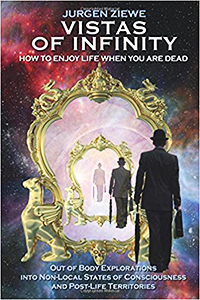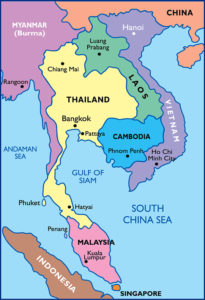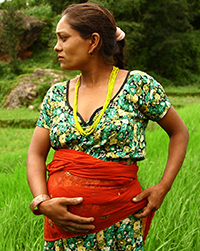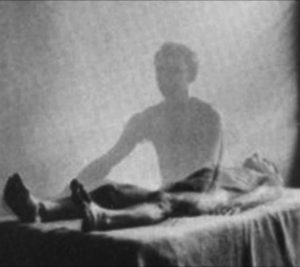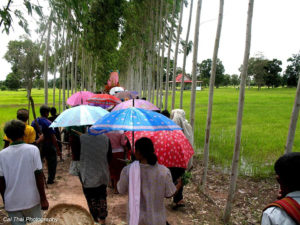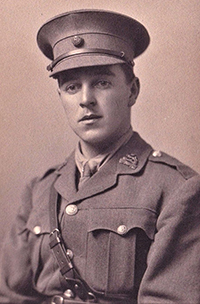 Article by: Walter Semkiw, MD
Article by: Walter Semkiw, MD
Source: Communication from the deceased in this case was facilitated through the direct voice mediumship of Leslie Flint. George Woods and Betty Green were present during tape recordings of Flint’s mediumship sessions and they asked questions of the deceased, who spoke in their own natural voices. Neville Randall reviewed these recordings and summarized the dialogues in his book, Life After Death. Dialogue in the article provided below has been slightly edited to make it more concise.
To learn more about the mechanism of communication with the deceased, go to: Leslie Flint and his Direct Voice Mediumship
Session of 11/4/60: Alf Pritchett describes his Death in World War I and his Existence in the Afterlife:
The Death of Alf Pritchett
Scene: Trenches of WW I in Belgium
“My name is Alf Pritchett. It must have been 1917 or 18. We were under heavy bombardment all day. Then in the early morning we were given the command to go over the top.
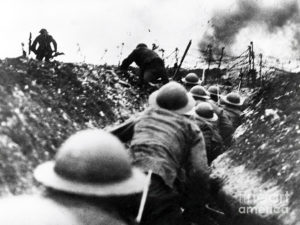 ‘Well,’ I thought. ‘This is it boy.’ And I must admit it took all I’d got to really get myself over the top.
‘Well,’ I thought. ‘This is it boy.’ And I must admit it took all I’d got to really get myself over the top.
I was running forward. Some of the Germans were coming towards me. They rushed past me as if they didn’t see me! I thought, ‘God, this is it.’
But instead of them attacking me or in any way taking any interest in me, they rushed straight past me!
I thought, ‘Well, Good Lord! I can’t make this out at all.’
Alf Doesn’t Realize that He was Killed
I went on. I can remember running and running and I thought, ‘Well, if they’re not going to see me I’m certainly not going to bother about them. I’m going to get into a little cubby hole somewhere and get out of it.’
I remember getting into a hole created by a bomb. I got into this hole and just crouched down and thought, ‘Well, I’ll wait until this is over and hope for the best, I might get taken prisoner. Who knows?
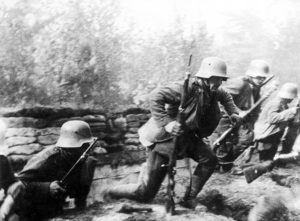 I was lying there thinking to myself, ‘Well, it’s damn odd they didn’t see me. They must have seen me. Yet they went straight past.’ And I started to think about it. And I thought, ‘Well, I don’t know.’
I was lying there thinking to myself, ‘Well, it’s damn odd they didn’t see me. They must have seen me. Yet they went straight past.’ And I started to think about it. And I thought, ‘Well, I don’t know.’
Alf’s Deceased Friend Billy Smart Escorts Him to Heaven
I don’t know how long I was in that hole. I thought I must have fallen asleep. I thought I should have felt stiff having slept in a bomb crater but I was not uncomfortable at all. I felt light as a feather
The next thing I knew is that I saw a bright light in front of me. It was as if the whole place was illuminated, so dazzling I could hardly look at it.
I saw the outline of a shape or figure appearing that gradually took shape. It was a human being full of luminosity. I recognized the person as an old friend who had been killed months before, whose name was Billy Smart.
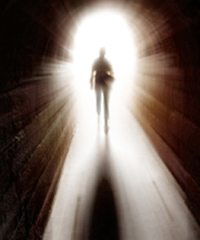 I went towards him as if I was drawn like a magnet. Billy looked wonderful, full of vitality and life with a wonderful color on his face. As I got near him it dawned on me that he was dead.
I went towards him as if I was drawn like a magnet. Billy looked wonderful, full of vitality and life with a wonderful color on his face. As I got near him it dawned on me that he was dead.
He sort of held out his hand. I felt a bit daft in a way because I knew it’s natural to shake hands, but there was me in a dugout shaking hands with someone who was dead. It put me in a cold sweat and I thought, ‘Well, what’s going on here? I must be dreaming or something.’
I could hear him speak and he says: ‘All right, nothing to worry about. You’re all right mate. Come on.’
Anyway, I got hold of his hand and suddenly there was us sort of a floating–I can’t say I was doing anything else but floating with my feet off the ground–going gradually higher and higher as if everything was getting further and further away. And I could see in the distance down below the battlefields, the guns and the lights and the explosions. The war was obviously still going on. And I thought: ‘Well, this is the most peculiar dream, this is.’
Alf Enters a Luminous City
 The next thing I remember was sort of gradually coming in sight of what appeared to be a big city. It was luminous. It is the only way I could describe it. The buildings had a sort of glow about them.
The next thing I remember was sort of gradually coming in sight of what appeared to be a big city. It was luminous. It is the only way I could describe it. The buildings had a sort of glow about them.
Anyway, to cut a long story short, I suddenly felt my feet touching the ground again. Most peculiar. It felt solid. I remember walking on what appeared to be a long avenue, and on each side were beautiful trees, and between every other tree or so there was a sort of statue. And on the sidewalk people were going about in a most peculiar sort of dress.
They were looking as they might have been Romans or Greeks or something you see in pictures. And there were beautiful buildings with pillars and beautiful steps leading up to them. Mostly flat-roofed, by the way. I don’t remember seeing any roofs or gables like one sees in England. And this sort of glow coming from them. All sorts of people there were, and horses.
Billy Informs Alf that He is Dead
Bill was talking away at me. ‘Of course, You know what’s happened to you?’
‘What’s happened to me? All I know is that I am having a good time here. It’s better than being down there in that lot. I shall be sorry to wake up.’
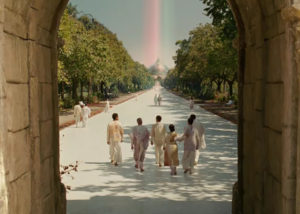 He says, ‘Don’t worry. You aren’t going to wake up.’
He says, ‘Don’t worry. You aren’t going to wake up.’
‘What do you mean, I’m not going to wake up?’
‘You’ve had it, chum.’
‘What do you mean I’ve had it?’
‘You’re dead.’
‘Don’t be silly,’ I says, ‘How can I be dead? I can see all that’s going on around me. I can see you. But I know you died some months ago. You may be dead, but I’m dreaming.’
‘No you aren’t. You really are dead.’
‘What?’ I says, ‘’You don’t mean to tell me this is heaven?’
‘Well, not exactly. But it’s an aspect.’
Billy brings Alf to a Reception Center
 Anyway, to cut a long story short, we went up this nice, very pleasant road in this beautiful city, and we came to a sort of hill. And right in front of me I could see what looked like a beautiful building. ‘What’s that place?’
Anyway, to cut a long story short, we went up this nice, very pleasant road in this beautiful city, and we came to a sort of hill. And right in front of me I could see what looked like a beautiful building. ‘What’s that place?’
‘Oh,’ he says. ‘You’re going there to meet some of your old friends. That’s what we call a reception center.’
‘A what?’ I says.
‘Like a kind of a hospital.’
‘Well,’ I says, ‘I don’t want to go to a hospital. There’s nothing wrong with me. I’m all right. And in any case I can’t get this at all.’
‘Don’t worry,’ he says. ‘Don’t tax your brain too much at the moment. It’ll come to you later. Just relax and enjoy yourself.’
‘Well,’ I said. ‘I’m doing alright. It’s a darn better than being down there.’
So we got to this place. We went in. There were all sorts of people there. But what struck me as odd was that they were dressed much the same as many people I had known, the way I used to dress myself. Suits and that sort of thing.
I never seem to remember seeing the Sun, yet there seemed to be plenty of light. And big windows. And people sitting around talking. There were tables and chairs. I didn’t see any beds, and I thought this is a strange hospital, yet it isn’t a hospital I suppose.
The Deceased can Enjoy Food in the Afterlife
 Everyone seemed to be quite bright and cheerful. Some were talking, and others were eating, and that struck me. I thought, ‘Well, I’ve got him here. He says this is part of heaven. They shouldn’t be eating. So I says, ‘Look. They’re eating over there.’
Everyone seemed to be quite bright and cheerful. Some were talking, and others were eating, and that struck me. I thought, ‘Well, I’ve got him here. He says this is part of heaven. They shouldn’t be eating. So I says, ‘Look. They’re eating over there.’
‘Ah,’ he says. ‘What you don’t realize is that when you come here, you feel it’s essential to do certain things. If you feel it’s essential to eat and drink, you can.’
I sat down around a table with several other blokes.
‘Just arrived?’ they says.
‘Yes.’
‘We heard you were coming,’ says one.
‘What do you mean? You heard I was coming? You don’t even know me.’
‘Well, that’s what you think,’ he says. ‘We have our scouts out, you know. Helpers. I was helped in the same way. I’ve only been here a short time myself.’
‘Oh,’ I said. ‘Settling in?’
‘Yes. Very nice. Much better than what they used to tell us down there, isn’t it?’
‘Tomorrow,’ he added, ‘I’m going to see my grandparents.’
So I says, ‘Oh, where are they?’
‘I’ve been told, they,’ he says, ‘that they’re on this plane, as they call it here, but further out. I’m being taken there.’
‘Very nice. Who’s taking you there?
‘My guide.’
‘Guide?’
‘Yes. There’s a nice fellow here. Like one of the stewards I suppose you’d call them. And he’s found out a little about my background and my people and he has been given the job of escorting me. By the way, did you notice when you came here how odd it was? How light you felt? The sort of floating feeling?’
‘Yes, it did feel a bit strange.’
 ‘Well, that’s the way we’re going. We’re not going to walk. We’re sort of going to…I suppose some people would call it flying. You seem to have taken to it all right.’
‘Well, that’s the way we’re going. We’re not going to walk. We’re sort of going to…I suppose some people would call it flying. You seem to have taken to it all right.’
In the Afterlife, You Judge Yourself
‘What else can I do?’ I says. ‘You’re told you’re dead. The best thing to do when you’re dead, I should think, is to follow instructions and behave yourself. After all, you never know who’s going to be judging you and all that.’
‘Ha,’ he says, “No one judges you. From what I can make out, you judge yourself. Since I’ve been here, I’ve been reflecting. Going back a bit on the old past, and wondering and thinking about things. The only thing is to judge yourself. After all, it’s your conscience. I’ve got one, and so have you, I bet. We all have.’
‘As far as I remember,’ I says, ‘the only thing I ever really did wrong was drowning the cat. Oh, and once I had a pint of beer and never paid for it because there was a crowd in there, and forgot about it and never offered it. I don’t see anything terribly wicked about that.’
‘You’ll be alright,’ he says. ‘Don’t worry.’
‘I’d like to go back,’ I says, ‘and see my people, and see how they are getting on. I wonder if they’ve heard about me being dead?’
‘If you want to go back,’ he says, ‘it can be arranged. One of those fellows who is in charge here can probably arrange it. Of course, it’ll only make you miserable, I should think. Because they don’t take a blind bit of notice of you. And then what? You can go back and knock on the wife’s door. Or you can go and bang on the old parson’s door, and he won’t take a bloody bit of notice of you, because he’s blind as a bat like the rest of them.’
Alf meets his Sister Lilly, who Died before Alf was Born
 Eventually the time came when this friend who’d brought me here came over to me and says: ‘I want to show you something.’
Eventually the time came when this friend who’d brought me here came over to me and says: ‘I want to show you something.’
So I says, ‘All right, mate,’ and I went with him.
He took me down a street. Past very attractive houses with little balconies and beautiful flowers. Down to the end of the street and out into a big square. With a big fountain playing in the middle. I could hear music. Smashing, wonderful music. And I thought, ‘This is real nice.’ It reminded me of the old days when I used to sit in the park and listen to the band.
We sat down on a little bench under a beautiful tree.
‘You’ll find this restful,’ he says. ‘You just sit there, I’ll leave you for a little while and come back to you.’
 I sat there with my eyes closed listening to the music. Then, all of a sudden, I had a feeling there was someone sitting next to me. I opened my eyes and looked and there was a beautiful lady. Beautiful blonde hair she had and looked about nineteen or twenty. I was really taken aback.
I sat there with my eyes closed listening to the music. Then, all of a sudden, I had a feeling there was someone sitting next to me. I opened my eyes and looked and there was a beautiful lady. Beautiful blonde hair she had and looked about nineteen or twenty. I was really taken aback.
She called me by my name. I thought, ‘Well that’s funny, she knows my name, but I don’t know her!’
‘Are you finding it nice here?’ she asks.
‘Very nice,’ I says. ‘Thank you miss.’
‘You don’t have to call me miss. Don’t you know me?’
‘No. I don’t know you.’
‘My name is Lilly.’
‘Lilly? I don’t know any Lilly.’
‘That’s not surprising, in a way. I’m your sister. I died when I was an infant.
‘Golly, I says,’ I remember my mother talking about a little girl who died when she was only a few days old. But you can’t be her. You’re all grown up.’
‘That’s right,’ she says, ‘I’m your sister. I died as an infant and I’ve grown up over here.’
‘Well, it beats me.’
‘I’m going to look after you now that you are here. I’m going to take you home.’
‘Home?’ I says.
‘Yes, home.’
‘Oh.’
 She took me out of the square down a broad avenue, lined with trees. We branched off, went down a slope and out into the countryside. Gradually we arrived at a small cottage. The nearest thing I’d seen to cottages at home in England. She stopped at a small place with its own garden with a little gate, a porch and a door. Plenty of lovely flowers, I noticed.
She took me out of the square down a broad avenue, lined with trees. We branched off, went down a slope and out into the countryside. Gradually we arrived at a small cottage. The nearest thing I’d seen to cottages at home in England. She stopped at a small place with its own garden with a little gate, a porch and a door. Plenty of lovely flowers, I noticed.
We went in. Off a little passage was a little room, all very cozy and comfortable. Nice chairs. No fireplace.
‘I see you don’t have fireplaces here,’ I said.
‘No,’ she said. ‘We don’t need fireplaces because it’s always warm and pleasant.’
‘That’s nice isn’t it. You don’t get any rain?’
‘No, we don’t have any rain. But we have dew sometimes.’
We sat there talking. About my mother and father and brother that I still had on Earth. She said she often went to see them, and me when I was on Earth, from infancy. She’d been with me all through the war years. She couldn’t–wasn’t with me when I died. But she got everything ready for me, knew I would be coming and that I’d be brought.
I thought, ‘Oh, this is nice.’ Then I thought, ‘Well, I don’t know, it’s strange.’ But I settled in and stayed with my sister. And perhaps I’d better come another time and tell you more about it.
‘I’m told my time is up. I must go. Bye, bye.’
Alf Prichett and Billy Smart are Identified through Military Records
Neville Randall researched British war records to try to see if he could confirm the identities of Alf Pritchett and his friend, Billy Smart. Neville was successful. Their identities are provided below:
Alf Pritchett, Private 9023, Machine Gun Corps, killed in 1971, buried in Potijze Chateau Lawn Cemetery, which is 1 mile from Ypres, Belgium. A link to the battle in which Alf was likely killed is provided below:
William (Billy) Smart, Private 20394, Machine Gun Corps, killed in 1916 near Arras, France.
Note: In the childhood past life memory case involving James Leininger, little James also reported that after he, as his past life persona, James Huston, Jr., died in a plane crash during WW II, three of his fellow aviators, who had died before Huston, welcomed him in heaven. Bruce Leininger, the father of James, was the principal investigator of his son’s case. Bruce was able to identify these three aviators specifically. To learn more, please go to:
James Huston, Jr. | James Huston Reincarnation Case


